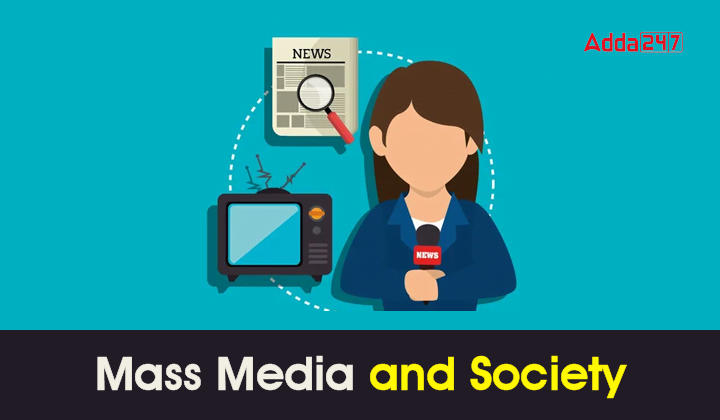Table of Contents
Mass media plays a pivotal role in modern society, serving as a powerful tool for communication and information dissemination. With its widespread reach and influence, mass media impacts various aspects of our lives, shaping our perspectives, and driving societal changes.
In this article, we will explore the dynamic relationship between mass media and society, highlighting its effects on culture, politics, economy, individual behaviour, and the different types of mass media platforms.
UGC NET Study Notes for Paper 1
Mass Media
Mass media refers to various forms of communication that reach a large audience simultaneously. It includes mediums such as television, radio, newspapers, magazines, the internet, and social media platforms. Mass media plays a significant role in shaping public opinion, disseminating information, and influencing social, cultural, and political trends.
Type of Mass Media
It’s important to delve into the various types of mass media which is crucial in comprehending the breadth and impact of mass media on individuals and society.

1. Print Media
Print media, like newspapers, magazines, and books, remains relevant despite the digital age. It offers comprehensive news coverage, features, and literary works. Its tangible format provides a reliable and immersive reading experience that many still value.
2. Broadcast Media
Broadcast media, like radio and television, reach a wide audience and shape public opinion. They offer news, music, talk shows, and entertainment. While digital platforms have impacted them, they still hold sway over a significant portion of the population, creating cultural phenomena and sparking national conversations.
3. Digital Media
The internet revolutionized mass media, bringing forth digital platforms. Websites, online news, and blogs provide real-time information with interactive features. Social media platforms like Facebook, Twitter, and Instagram allow for widespread content sharing and discussion.
4. Social Media
Social media platforms like Facebook, Twitter, and Instagram wield significant influence. They connect people, facilitate content sharing, and enable real-time discussions. News consumption has transformed with personalized information feeds and active participation in conversations.
Mass Media and Society
Mass media has a profound impact on society, shaping opinions, disseminating information, and influencing cultural norms. The intricate relationship between mass media and society, highlighting its influence is as follows:
-
Cultural Influence
- Mass media shapes cultural norms and values through platforms like television, films, music, literature, and the Internet. It introduces new ideas, challenges stereotypes, and promotes inclusivity.
- Diverse portrayals of ethnicities, gender roles, and social issues challenge existing norms, while cultural exchanges foster cross-cultural understanding. Mass media acts as a mirror, reflecting and influencing societal values, and shaping cultural identities.
-
Political Impact
- Mass media is vital for democracy, functioning as a watchdog and facilitating public discourse. Through news outlets, investigative journalism, and social media, it informs citizens, encourages participation, and holds authorities accountable.
- However, media bias and sensationalism can polarize public opinion. The rise of social media amplifies these effects, impacting elections and public sentiment through rapid information dissemination, both accurate and misleading.
-
Economic Implications
- Mass media fuels the global economy through advertising, creating jobs and driving consumerism. It shapes consumer behaviour, influencing purchasing decisions and economic growth. TV, print, online, and social media platforms contribute to its economic impact.
- The media industry generates revenue, supporting diverse professions. The digital age has brought about new business models in response to changing preferences and technology.
-
Individual Behavior
- Mass media shapes individual behaviour, influencing attitudes, beliefs, and aspirations. It exposes people to diverse cultures and ideas, impacting self-perception and social expectations.
- However, the immersive nature of digital media can contribute to addiction, cyberbullying, and mental health issues. Mass media platforms like TV shows, movies, and social media play a significant role. Yet, mass media can also empower individuals through education, information access, and social change promotion, fostering activism for various causes.
In conclusion, the relationship between mass media and society is dynamic and multifaceted. Mass media serves as a crucial communication tool, disseminating information, and connecting individuals. It influences cultural norms, challenging stereotypes, and promoting inclusivity. Additionally, mass media shapes public opinion and political discourse, although it is important to have a check on media bias and misinformation.
Download Mass media and society Study Notes PDF



 Odisha LTR Previous Year Question Paper,...
Odisha LTR Previous Year Question Paper,...
 UGC NET Assistant Professor Salary, Chec...
UGC NET Assistant Professor Salary, Chec...
 Assam TET Teacher Salary In Hand, Allowa...
Assam TET Teacher Salary In Hand, Allowa...














